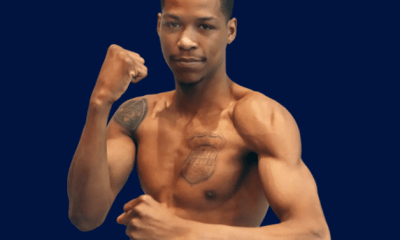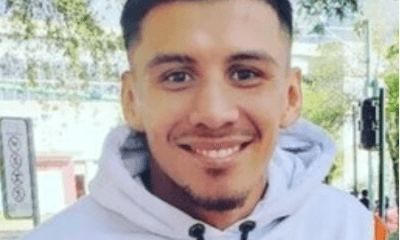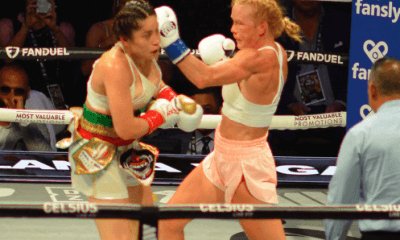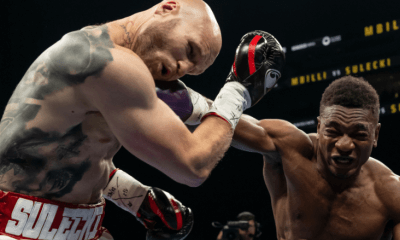Featured Articles
Russia vs. Ukraine and the War’s Impact on the Boxing Landscape
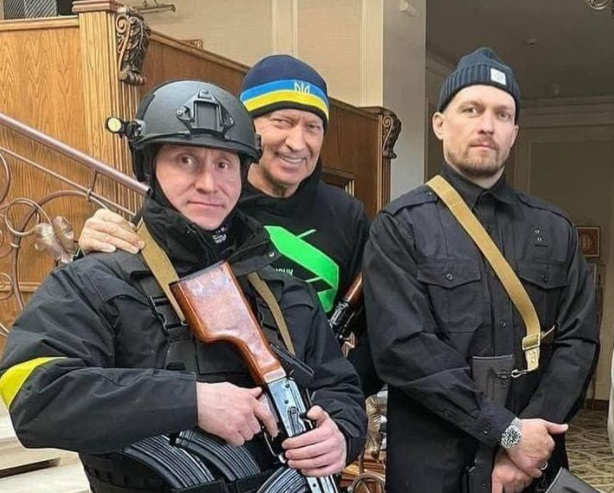
Russia vs. Ukraine and the War’s Impact on the Boxing Landscape
Boxing is very familiar with war as a metaphor for what sometimes goes on in a prize ring. At the Olympic level of competition, it is literally nation versus nation and country versus country.
There is a science to boxing and an art to war. Neither fall outside the bounds of acceptable human conflict. Both have a set of rules but can still very easily lead a combatant to death.
Marvin Hagler and Tommy Hearns went to WAR in 1985. The ‘Marvelous One’ won the war in three savage rounds. The ‘Hitman’ lived to fight another day. Fight fans want to see such wars when they watch boxing matches; opposing physical forces exchanging bursts of kinetic energy.
When I broke into the boxing media in 2011, Vitali Klitschko was the first boxer I questioned on my first ever boxing media conference call. In 2018, I covered Lomachenko-Linares at Madison Square Garden. I was there when Russian heavyweight Magomed Abdusalamov almost died in New York City.
It is with this in mind that I consider the current conflict involving Russia and Ukraine. There is no shortage of boxers (or soldiers) from either country. In fact, some of the Ukrainian boxers are joining the fight. This includes the Klitschko brothers, Vasyl Lomachenko and Oleksandr Usyk (pictured on the right in a recent photo).
Russian boxers are still in the ring—for now.
Dmitry Bivol has agreed to fight superstar Canelo Alvarez in a lucrative May 7th PPV bout we all hope becomes a war in the ring. Russian mauler Artur Beterbiev hopes to battle Long Island warrior Joe Smith Jr. this summer in a light heavyweight unification conflict. Both Bivol and Beterbiev are at risk of being professionally sanctioned because of where they were born.
All of the major governing bodies in boxing have announced a boycott against sanctioning any title fights in Russia. The WBA and WBO intend to temporarily remove all Russian boxers from their rankings.
The NHL is under pressure to ban all Russian players regardless of ideology. If cancel culture comes to boxing, Russian boxers could be blacklisted for not denouncing their own country.
POLITICS & PUGILISM
Former WBC heavyweight champion of the world Vitali Klitschko is the Mayor of Kyiv, Ukraine’s capital city. He and brother Wladimir are presently at risk of being killed or captured by Russian forces. Vitali claims to be “hunting down Russian saboteurs” in Kyiv and he’s imposed a curfew.
Ukraine is already under martial law. Armed looters are making a bad situation even worse.
Unified world heavyweight champion Oleksandr Usyk has now joined Lomachenko and the Klitschko brothers in taking up arms to defend Kyiv. The locked and loaded WBA/IBF/WBO heavyweight champion addressed the President of Russia, Vladimir Putin, on Instagram.
“You can stop this war,” said Usyk. “Please just sit down and negotiate with us.”
Putin responded, but to the world. “I would like to emphasize that Ukraine is not just a neighboring country for us. It is an inalienable part of our history, culture and spiritual space.”
The Ukrainian Usyk has previously beaten a Russian boxer in Russia (2018 UD over Murat Gassiev in Moscow) but he sure doesn’t want to fight Russian soldiers on the streets of Kyiv.
“I’d [also] like to speak to the people of Russia,” said Usyk. “If we consider ourselves as brothers, Orthodox ones, do not let your children set out to our country, do not fight with us.”
FREEDOM FIGHTERS
There are photos of Loma and Usyk in camo slinging rifles. Fighters fight, right? But why?
Both Lomachenko and Usyk are in the primes of their respective careers. Both are considered to be elite pound-for-pound rated boxers. Before war broke out at home, Usyk was in talks for a rematch with Anthony Joshua while Lomachenko was climbing back up the lightweight ranks.
That’s all on hold for now.
Russia’s Vladimir Putin claims that international corruption and a breakdown in diplomatic relations, particularly with the United States, has forced his hand. “Lies and hypocrisy at the highest level,” alleges Putin. In 2014, my KO Digest blog secured an interview with then world heavyweight champion Wladimir Klitschko and we asked him about the conflict in Ukraine.
“We’ve got a geopolitical problem because Crimea is now taken by Russia, which is a tremendous historical mistake,” said Klitschko. “It breaks international and geopolitical law.”
“You cannot just take over part of a country because you think it belongs to you.”
Obviously, things have gotten worse since 2014. Russia has invaded Ukraine. The final fate of that country is presently being determined by armed forces exchanging bursts of kinetic energy. Both sides are killing the other and trying to avoid being killed. How will victory be determined?
There are no ringside judges in a war zone, no referee to stop the fight or enforce the rules.
“The complication of the situation is out there,” said Klitschko. What many casual observers fail to realize is that Russia is no longer a godless communist country. Only 13 percent of the population identified as atheist in a 2013 survey. The majority in both Russia and the Ukraine adhere to a strand of Orthodox Christianity. The president of the Ukraine, former TV actor Volodymyr Zelenskyy, is Jewish.
“Politicians are trying to brainwash people with their system, with their agenda, and with their propaganda,” insisted Klitschko. “I’ve seen it. I’ve been around long enough. I was born in the Soviet Union and I grew up in the Soviet Union and I know what ‘Soviet times’ means.”
It means a shot in the arm for Ivan Drago.
“The Ukrainian people want to live in a country without corruption and dictatorship like we had under President Yanukovych,” explained Klitschko. “Ukraine is going through a lot of crises right now, political, geopolitical, and economic crisis. Fortunately, the world was paying attention.”
Today it’s the biggest story in the world. Eight years ago, ‘Doctor Steelhammer’ tried to explain.
“Ukraine is coughing out the Soviet times, that’s what is happening,” he said. “It’s like a side effect after a certain illness, when you have a cold and you’re coughing out things like that.”
“Eventually, we’re going to get healthy.”
Here’s to war in the ring—but peace outside of it.
Boxing Writer Jeffrey Freeman grew up in the City of Champions, Brockton, Massachusetts from 1973 to 1987, during the Marvelous career of Marvin Hagler. JFree then lived in Lowell, Mass during the best years of Irish Micky Ward’s illustrious career. A former member of the Boxing Writers Association of America and a Bernie Award Winner in the Category of Feature Story Under 1500 Words. Freeman Covers Boxing for the Sweet Science in New England.
To comment on this story in the Fight Forum CLICK HERE
-

 Featured Articles3 weeks ago
Featured Articles3 weeks agoAvila Perspective, Chap. 330: Matchroom in New York plus the Latest on Canelo-Crawford
-

 Featured Articles2 weeks ago
Featured Articles2 weeks agoVito Mielnicki Jr Whitewashes Kamil Gardzielik Before the Home Folks in Newark
-

 Featured Articles4 weeks ago
Featured Articles4 weeks agoAvila Perspective, Chap 329: Pacquiao is Back, Fabio in England and More
-

 Featured Articles3 weeks ago
Featured Articles3 weeks agoOpetaia and Nakatani Crush Overmatched Foes, Capping Off a Wild Boxing Weekend
-

 Featured Articles2 weeks ago
Featured Articles2 weeks agoCatching Up with Clay Moyle Who Talks About His Massive Collection of Boxing Books
-

 Featured Articles4 weeks ago
Featured Articles4 weeks agoFabio Wardley Comes from Behind to KO Justis Huni
-

 Featured Articles1 week ago
Featured Articles1 week agoMore Medals for Hawaii’s Patricio Family at the USA Boxing Summer Festival
-

 Featured Articles4 weeks ago
Featured Articles4 weeks agoDelving into ‘Hoopla’ with Notes on Books by George Plimpton and Joyce Carol Oates

